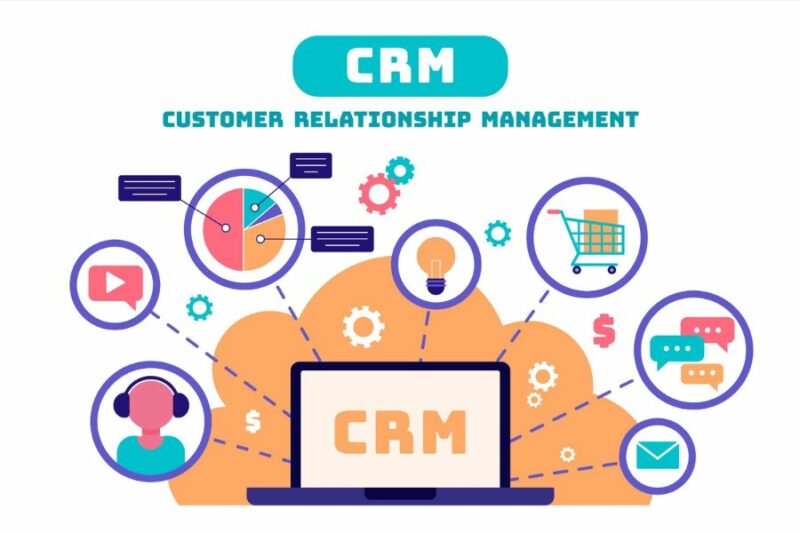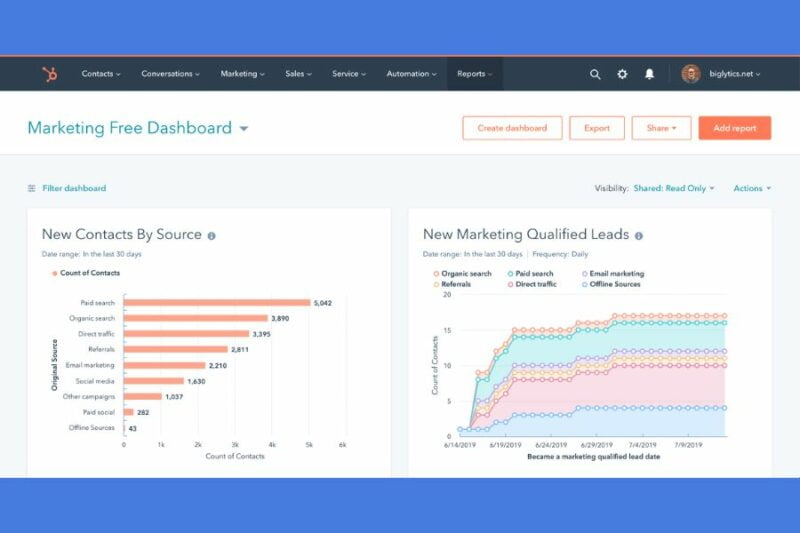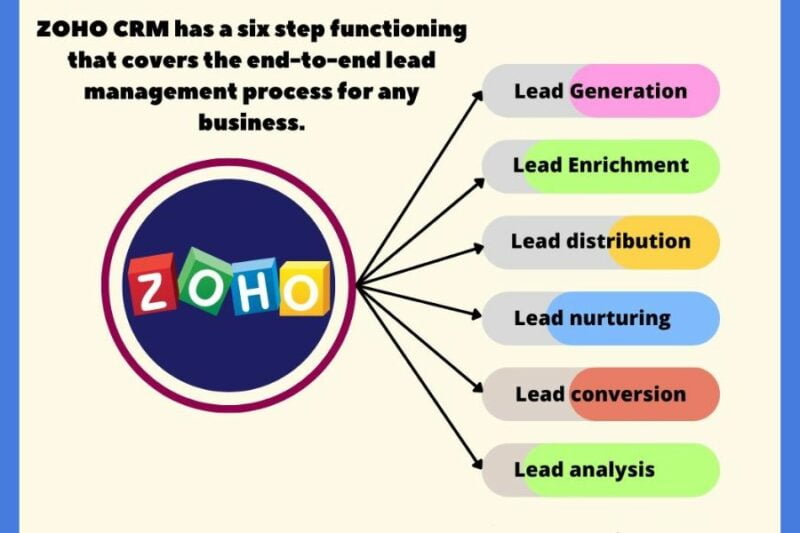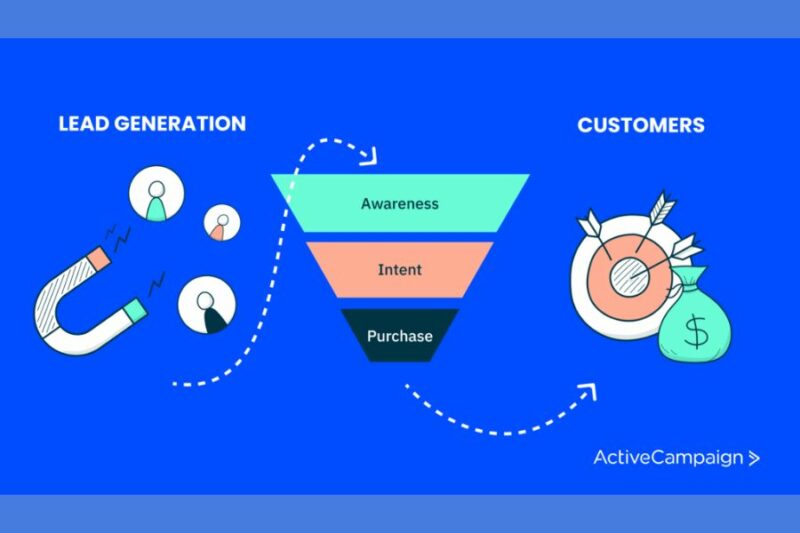Ever wonder how businesses manage to keep track of all their customer interactions, preferences, and still manage to turn potential leads into loyal customers? Well, that’s where Customer Relationship Management (CRM) steps in – the unsung hero behind the scenes.
Picture this: a tool that not only organizes and centralizes all customer data but also plays a crucial role in turning qualified leads into clients.
In this article, we’re diving into the fascinating world of CRM and its pivotal role in lead generation and management. So, buckle up as we explore the connection between building meaningful customer relationships and the art of generating and managing quality leads!
Key Features of CRM Lead Management Tools

Now that we’re familiar with the essential role of CRM in businesses, let’s zoom in on the powerhouse features that make these systems game-changers:
Data Management and Organization
- Centralized customer data – CRM systems act as a centralized hub for all customer information. Imagine having every detail about your customers – from their contact information to purchase history – neatly organized in one place. It’s like having a personal assistant who never forgets a thing.
- Contact segmentation – Ever heard the saying, “One size fits none”? Well, CRM takes that to heart. It allows businesses to segment their contacts based on various criteria like demographics, behavior, or purchase history. This segmentation helps in tailoring communication for a more personalized approach.
Communication Tracking
- Email interactions – Emails are the lifeline of many businesses. CRM systems track email interactions, providing insights into which messages are resonating with customers. This helps in refining future communications for maximum impact, regardless of where the customer is in the sales pipeline.
- Social media engagement – In the era of likes, shares, and retweets, CRM extends its reach to Facebook and other social media platforms. It monitors and records customer interactions on networks like Facebook, Twitter, and LinkedIn. This comprehensive view enables businesses to stay engaged with their audience across various channels.
Automation and Workflow
- Streamlining processes – Say goodbye to tedious, repetitive tasks. CRM systems automate routine processes, freeing up valuable time for your team. From data entry to task assignments, automation ensures efficiency and minimizes the risk of human error.
- Time-saving benefits – Time is money, right? CRM systems save precious hours by automating workflows. This means your team can focus on what they do best – building relationships and closing deals – while the system takes care of the nitty-gritty details.
CRM systems are the organizational wizards that transform heaps of customer data into actionable insights, making the process of managing relationships and generating leads not just efficient but downright exciting. Ready to dive deeper? Let’s explore how CRM plays a vital role in the lead generation game.
The Role of CRM in Lead Generation
CRM plays a pivotal role in lead generation, acting as a strategic ally in converting potential prospects into valued customers.
Identification of prospects
CRM systems utilize customer data to identify potential leads by analyzing patterns and behaviors. This allows businesses to target individuals who are more likely to engage and convert.
Lead profiling
CRM assists in creating detailed lead profiles, offering insights into the preferences, needs, and behaviors of potential customers. This nuanced understanding enables businesses to tailor their approach for more effective engagement.
Behavior tracking and analytics
By tracking customer interactions and analyzing behavioral data, CRM systems provide a real-time snapshot of lead engagement. This allows businesses to make informed decisions and adjustments to their lead generation strategies.
Targeted marketing campaigns
CRM enables businesses to design targeted marketing campaigns based on the preferences and behaviors of specific customer segments. This personalized approach increases the likelihood of capturing the attention and interest of potential leads.
Personalization based on CRM insights
The insights gathered by CRM systems allow for personalized communication. Whether through emails, advertisements, or other channels, businesses can tailor their messages to resonate with the unique needs and interests of leads.
CRM Platforms for Lead Generation and Management
When it comes to harnessing the power of CRM for lead generation and management, several platforms stand out, each offering unique features tailored to the diverse needs of businesses. Here’s a closer look at three prominent CRM platforms in the lead generation and management landscape:

HubSpot
HubSpot offers arguably the best lead management software there is. It’s renowned for its user-friendly CRM platform that seamlessly integrates with marketing, sales process, and customer service tools. It provides a centralized hub for you to manage leads and customer interactions, as well as automate various processes, e.g., lead scoring depending on custom criteria.
HubSpot’s CRM is designed to enhance lead generation strategies through lead management features like lead nurturing workflows, contact segmentation, and personalized communication. Its integration with marketing tools facilitates smooth transitions from lead generation to conversion. This may be the right lead management software for you.
Here’s how you can connect Facebook leads to HubSpot.

Zoho
Zoho CRM stands out for its versatility, offering a comprehensive suite of tools for managing customer relationships. From contact management to workflow automation, Zoho CRM provides a 360-degree view of customer interactions.
Numerous case studies highlight Zoho CRM’s success in lead generation across various industries. Businesses have reported increased efficiency, improved lead conversion rates, and enhanced collaboration among teams using Zoho’s CRM solutions.

ActiveCampaign
ActiveCampaign is a dynamic CRM platform known for its robust automation features. It goes beyond traditional CRM functionalities by offering advanced automation capabilities that streamline lead nurturing processes.
ActiveCampaign’s automation features enable businesses to create intricate workflows for lead nurturing. From personalized email sequences to behavior-triggered actions, it ensures that potential leads receive tailored communication at every stage. (Read how to send Facebook leads to ActiveCampaign instantly.)
These CRM platforms serve as more than just databases; they are dynamic tools that empower businesses to not only manage customer relationships but also drive successful lead generation campaigns. Whether you’re looking for user-friendly interfaces, comprehensive suites of tools, or advanced automation, these platforms have got you covered.
Benefits and Challenges of Using CRM Lead Management
Implementing CRM systems for lead generation and management brings a host of advantages, but it’s not without its challenges. Let’s delve into the benefits and potential hurdles:
Benefits of Using a CRM Lead Management Software
Improved Lead Tracking and Management
Lead tracking software of CRM systems excel in organizing and tracking leads, providing a centralized repository for all interactions. This results in a more efficient lead management process, ensuring that opportunities are not overlooked.
Enhanced Customer Engagement
By leveraging customer data and insights, CRM facilitates personalized communication. This enhanced engagement helps build stronger relationships with leads, fostering trust and loyalty.
Data-Driven Decision Making
CRM systems offer robust analytics and reporting tools, allowing businesses to make informed decisions based on real-time data. This data-driven approach is invaluable for refining lead generation strategies and optimizing outcomes.
Efficient Communication
Automation features within CRM streamline communication processes. Whether it’s sending targeted emails or setting up follow-up tasks, CRM ensures that the right message reaches the right leads at the right time.
Increased Sales Productivity
With routine tasks automated, sales teams can focus on high-value activities such as lead nurturing and closing deals. This boosts overall productivity and contributes to the bottom line.
Challenges of Using a CRM Lead Management System
Implementation and Onboarding Hurdles
Introducing a CRM system can be met with resistance, and the initial implementation phase may pose challenges. Training staff and ensuring a smooth onboarding process are crucial to overcoming these hurdles.
Data Security and Privacy Concerns
Handling sensitive customer data comes with the responsibility of ensuring robust security measures. CRM systems need to address concerns related to data breaches, unauthorized access, and compliance with privacy regulations.
Integration Complexity
Integrating CRM with existing systems and workflows can be complex. Ensuring seamless integration is essential to avoid disruptions and ensure a smooth flow of data across different departments.
User Adoption Challenges
If team members don’t fully embrace the CRM system, its effectiveness diminishes. Encouraging and ensuring widespread adoption requires ongoing training and support.
Costs and ROI Measurement
The initial investment in CRM implementation and maintenance can be significant. Measuring the return on investment (ROI) becomes crucial.
While CRM systems significantly contribute to effective lead generation, businesses must navigate challenges to maximize the benefits. Strategic planning, continuous training, and a proactive approach to addressing challenges are key to a successful CRM implementation.
Best Practices for Integrating CRM into Lead Generation
Successfully integrating CRM into your lead generation strategy requires a strategic and thoughtful approach. Here are some best practices to ensure a seamless and effective integration:
- Regularly update and cleanse your customer data within the CRM system. Accurate and up-to-date information ensures that your lead scoring and segmentation processes are based on reliable data.
- Tailor your lead management tools to align with your unique business processes and needs. Customization ensures that the CRM solution enhances your operations rather than imposing rigid structures.
- Choose a CRM platform that seamlessly integrates with other essential tools in your tech stack. This ensures a smooth flow of data across different departments, creating a unified ecosystem.
- Invest in comprehensive training for your team to ensure they are familiar with the CRM tools and understand how to leverage them effectively. User adoption is key to realizing the full benefits of CRM integration.
- Clearly define the criteria for lead scoring within the CRM system. This ensures that your marketing and sales teams focus their efforts on new leads that align with your business objectives, improving overall efficiency.
- Leverage the automation capabilities of your CRM software to streamline routine tasks. Automation not only saves time but also reduces the risk of errors associated with manual data entry and management.
- Establish a feedback loop to continuously improve your lead generation strategies. Regularly review CRM analytics and performance metrics to identify areas for enhancement and refinement.
- Prioritize a user-friendly interface and experience. A CRM system that is intuitive and easy to navigate encourages sales team members to actively engage with the platform, maximizing its impact on lead generation.
- Foster collaboration between sales and marketing teams within the CRM platform. Ensure that both teams have access to the same information, promoting a unified approach to lead generation and nurturing.
- Implement robust analytics to measure the results of your lead generation efforts. Track key metrics such as conversion rates, customer acquisition costs, and return on investment to inform future strategies.
By adhering to these best practices, you can unlock the full potential of CRM integration.
Ready to Turn Leads Into Loyal Customers?
In the intricate dance of modern business, where customer relationships intertwine with the pursuit of meaningful leads, the importance of a CRM lead management system shines brighter than ever. Through our exploration, we’ve uncovered the critical role of CRM not only in orchestrating seamless customer interactions but also as the driving force behind triumphant lead generation endeavors.
In the realm of CRM, platforms like HubSpot, Zoho, and ActiveCampaign have emerged as stalwarts, providing businesses with a robust framework to turn raw data into strategic insights.
As these platforms continue to evolve, a rising star like LeadSync has taken the stage, offering a specialized niche in connecting CRM systems seamlessly with Facebook lead ads.
LeadSync: Revolutionizing Facebook Lead Ads Integration with CRMs
LeadSync’s innovative approach is particularly notable in its seamless integration with Facebook lead ads. This integration ensures that valuable leads captured through Facebook campaigns seamlessly flow into CRM systems, eliminating the need for manual data entry and reducing the risk of missed opportunities.
Expanding Horizons: Beyond CRM Integration
LeadSync doesn’t stop at CRM integration alone.
It extends its capabilities to synchronize with marketing funnels, ensuring a cohesive and streamlined customer journey from lead acquisition to conversion. The incorporation of SMS and email functionalities adds a multi-channel dimension to lead nurturing, allowing businesses to engage with their leads through their preferred communication channels.
As businesses strive to connect with their audience on a deeper and more personalized level, LeadSync’s integration capabilities provide a bridge between the vast landscape of Facebook and the structured environment of CRM systems. This not only enhances operational efficiency but also maximizes the potential for lead conversion.
The harmonious marriage of CRM systems with innovative solutions like LeadSync marks a paradigm shift in how businesses approach lead generation.
By leveraging these tools, you’re not just managing relationships effectively but also propeling leads through marketing funnels, SMS, and email campaigns with precision. Start a FREE trial!
Luke is the founder of LeadSync and, as a Digital Marketer, has been helping businesses run lead generation campaigns since 2016.

